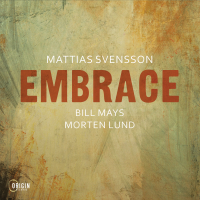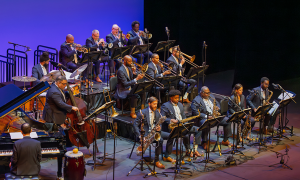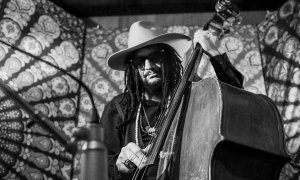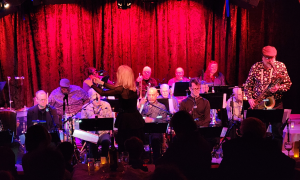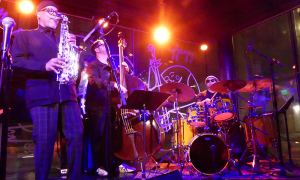Home » Jazz Articles » Live Review » Henry Threadgill: Very Very Threadgill 2014
Henry Threadgill: Very Very Threadgill 2014
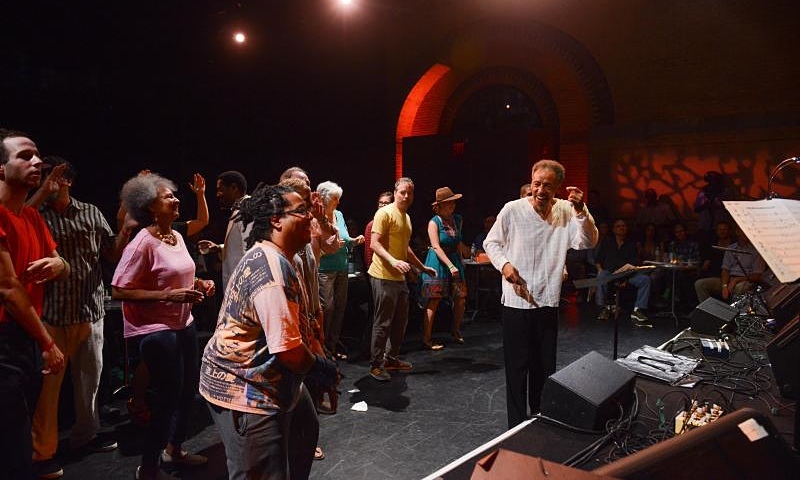
Harlem Stage Gate House
Very Very Threadgill
New York, NY
September 27-28, 2014
Henry Threadgill isn't one to repeat himself. In nearly 40 years of recording, he's only repeated a few compositions. So why would a retrospective of his work by a mere recapitulation? Very Very Threadgill—held Sept. 27 and 28 at the Harlem Stage Gatehouse in upper Manhattan—was a tribute comprised of realizations, not reunions. Pieces from the past were re-imagined and bands reconfigured—to the extent that some players took the stage not for the music they'd had a hand in recording but with another lineup from the rich history of Threadgillia.
The beautiful theater—once a part of New York's aqueduct system —was filled to its capacity of a mere 190 for both of the long programs. Saturday night featured music from Threadgill's first two major bands—the trio Air and his Sextett— while a Sunday matinee that stretched into the evening focused on post-1990 work, including a very rare appearance by the Society Situation Dance Band.
While Threadgill, who turned 70 this year, is well regarded as a saxophonist and a bandleader, his talent for songwriting is often overlooked— perhaps because it's so rarely on display. But it was one of the currents that ran strongest through the two days. The first night ended with the trio Harriet Tubman (guitarist Brandon Ross and drummer JT Lewis, both members of Threadgill's '90's outfit Make a Move, and bassist Melvin Gibbs) joined by Cassandra Wilson for "Apricots on Their Wings," a song Wilson sang on Threadgill's 1986 album New Air with lyrics that constitute an uncommon jazz psychedelia. Wilson clearly enjoyed revisiting the tune (she also recorded it on her 1987 album Days Aweigh), smiling and dancing between verses and encouraging Gibbs to stick with a riff so she could lay in a little throaty scatting that morphed into a couple of lines of "thank you, Henry." It was one of the high points in a weekend of spirited performances.
Pyeng Threadgill—who has released three albums of her own jazz inflected blues tunes—sang two of her father's songs in two different sets. Accompanied by pianist Jason Moran, who organized the weekend, she sang "A Piece of Software," a soulful, ballad during a set purportedly of chamber works (which was either poorly labeled or poorly curated but was musically strong nonetheless). The chorus-less song, with lyrics by Wilson and originally sung by Amina Claudine Myers on the Sextett's Subject to Change, wouldn't be out of place on a pop diva's album. Pyeng also took the stage during the rousing closing set by the Society Situation Dance Band. Also appearing during the dance band's set, were Fay Victor and Claudia Acuña.
Not surprisingly, the less complicated material tended to get the freer interpretations. The opening set was given to the music of Air, Threadgill's first major band and his smallest. It's hard to imagine that music without the distinctive voices of bassist Fred Hopkins and drummer Steve McCall, and the new formulation didn't try to emulate it. The ensemble moved between a duo, a quartet and a quintet. Darius Jones and Steve Lehman took "Keep Right on Playing, Through the Mirror and Over the Water" as a duet with perhaps a nod to Dolphy on Lehman's part, and the two saxophonists alternated with the full band (Moran on piano, Henry Grimes on bass and Pheeroan AkLaff on drums), joining forces for a full-band blowout on "Sir Simpleton." Grimes proved an odd choice for the chair of the enigmatic and rock solid Hopkins. More often than not Moran comped bass parts on piano with Grimes embedded in the rhythm section. They didn't sound like Air and didn't try to. They didn't play rags or fall into bold group statements. Rather, they were a band playing their own take on four songs from a beloved band from decades past.
The Sextett set that followed included two musicians who had played with that band in the '80s—akLaff and trombonist Craig Harris—and true to its form wasn't limited to six members, working between seven-and eight-piece with Jones and Lehman again switch-hitting, delivering their own takes on the Threadgill's trademark alto bleat. They opened with a long drum duo (akLaff and Lewis) before the band worked into the bopping march of "Gateway." The strings lacked the punch of the powerful Hopkins / Deidre Murray combo but playing arco during "Theme for Thomas Cole" they fared better. The whole of the band, in fact, started hesitantly, with a looseness that may have come from the fact that they weren't the working, touring band the Sextett was. But they found their own flow, their own chemistry, allowing themselves room (it seemed) for spontaneity. The music gelled in "Spotted Dick is Pudding," with a false ending and Harris conducting, pushing the band to the edge. By the closer, "Black Hand Bejewelled" it was as if a fire had caught flame. Christopher Hoffman made the opening cello part his own, light years from the anyway inimitable Deidre Murray, not just in the touch but devising new modulations. Harriet Tubman ended the first night with the unforgettable take on "Apricots on Their Wings," but not before playing a few Very Very Circus and Make a Move tunes. They were dark and breezy, playing at mysterious tempos and with a minimum of notes and a mutual trust without which the loping rhythms would have fallen apart.
The two days followed a strange trajectory, as if a single band warming up, a steady incline to the twice-in-a-lifetime finale. There were a few flat out flubs on the first day (and on the part of more than one player), showing that this music isn't music that can be taken on lightly. Things that might seem on casual listen like an A/B call- and-response are often complicated rotations of scored rephrasings bouncing between subsets of the band.
Sunday afternoon opened under the "chamber music" banner although for the most part that seemed to just mean "quieter"; Threadgill's guitar quartets, for example, would have been welcome in a program dedicated to through-composed music. Instead, Moran took one of those pieces ("Over the River Club," from Song Out of My Trees) as a piano solo, then duetted with Greg Osby on the Very Very Circus tune "Too Much Sugar" and Make a Move's "Laughing Club." If it was a bit jazzier than what is commonly meant by "chamber music," pianist David Virelles's solo reading of the Sextett's "To Be Announced" and Make a Move's "Where Coconuts Fall" struck a more formal air. Imani Wind's arrangement of "Gift" for flute, clarinet, oboe, bassoon and French horn was gorgeous, with the reeds taking it away from the Sextett's brass setting while staying faithful to the composition's recorded form. Their take on "Black Blues," also first recorded by the Sextett, perhaps didn't find the same sort of new life—it still wanted to be a brass band song but was a bold move anyway and allowed space for a spirited, hammered solo from Moran.
Very Very Circus, the keynote set and perhaps the most anticipated, started boldly with a shekere solo by saxophonist Yosvany Terry (who with drummer Craig Weinrib emerged from the weekend as the names to watch) reminiscent of one of the multi-cultural constructions from Too Much Sugar For a Dime until guitars and drums pushed into "Hope-A Hope-A," from the band's first album, with tubist Marcus Rojas (he and trombonist Curtis Fowlkes being the only member of the band in the lineup) conducting from the rear. The bright and dizzying songs needed little augmentation. Just as Beethoven and Marvin Gaye need to be heard in a pure and unadorned state every so often, so must this music be heard, and after 20 years it was remarkable to be reminded that it didn't only exist on record. "Little Pocket-Sized Demons" was the most guitar-centric piece they played, with Liberty Ellman expertly negotiating the complex rhythms and Martin Sewell pulling out a solo all his own that still recalled original VVC guitarist Masuja. Ellman's solo harkened back to Ross and his work in the group, or of himself, but also of Threadgill. To call them "solos" would partially miss the point: They're largely written parts with room for embellishment.
In any event, soloists in Threadgill's music play Threadgillian solos, which can be attested to by how different the players usually sound outside the bands. And solos were rarely solo in Very Very Circus, for that matter, although the VVC practice of dual solos (not really duets but concurrent, individual statements) wasn't really employed at the Gatehouse until five songs in and a memorable escalation by Sewell and Terry.
During an onstage interview, Threadgill had said—albeit with a broad grin— that he considers everything he does to be mainstream. The closing set by the Society Situation Dance Band seemed set to prove that claim, at least initially, for what was likely the second time they've played in North America. (the only other being at the 1998 Texaco NY Jaazz Festival in lower Manhattan). It was also the only set where Threadgill took the stage (or the floor in front of it anyway), conducting the 15-piece band, moving back and forth across the front, smiling and laughing and, yes, dancing. Fay Victor joined the ensemble to belt the bluesy "Everybody Will Hang by the Leg" which ended with her and James Carter, who proved to be the band's MVP, engaging in an impromptu duo and ending the song.
After the first two tunes, however, they submerged into darker climes while still bearing a current of big band Basie, of the tradition. Claudia Acuña joined for the Very Very Circusesque "False Face" Pyeng Threadgill returned for the oddly upbeat "The Last Mango" and they closed with a fantastic, if unlikely, arrangement of the downtempo Make a Move march "The 100 Year Old Game." Empty tables had been pushed back and chair coralled between them and Moran and Harlem Stage Executive Director Patricia Cruz had been the first to take the makeshift dance floor, but it had filled quickly. A boy of about eight breakdanced in the center as trombonist Frank Lacy popped and locked from the bandstand. It was a joyous situation, and if it was hard to say exactly what sort of situation it was it still seemed very, very much the way a society should be.
Tags
Henry Threadgill
Live Reviews
Kurt Gottschalk
United States
New York
New York City
Brandon Ross
JT Lewis
Melvin Gibbs
Cassandra Wilson
Pyeng Threadgill
Amina Claudine Myers
Fred Hopkins
Steve McCall
Darius Jones
Steve Lehman
Henry Grimes
Pheeroan AkLaff
Craig Harris
Deidre Murray
Greg Osby
David Virelles
Yosvany Terry
Craig Weinrib
Marcus Rojas
CURTIS FOWLKES
Liberty Ellman
Martin Sewell
Masuja
James Carter
Frank Lacy
PREVIOUS / NEXT
Support All About Jazz
 All About Jazz has been a pillar of jazz since 1995, championing it as an art form and, more importantly, supporting the musicians who make it. Our enduring commitment has made "AAJ" one of the most culturally important websites of its kind, read by hundreds of thousands of fans, musicians and industry figures every month.
All About Jazz has been a pillar of jazz since 1995, championing it as an art form and, more importantly, supporting the musicians who make it. Our enduring commitment has made "AAJ" one of the most culturally important websites of its kind, read by hundreds of thousands of fans, musicians and industry figures every month.
















